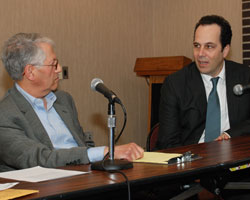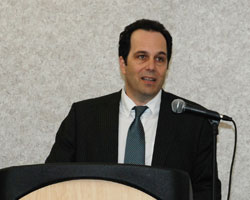- About Ramapo
- Academics
- Admissions & Aid
- Student Life
- Athletics
- Alumni
- Arts & Community
- Quick Links
- Apply
- Visit
- Give
Author/Editor Gourevitch presents 1st Annual Gumpert Lecture
(PDF) (DOC) (JPG)April 1, 2009

Philip Gourevitch (r.), Editor of the Paris Review, with Dr. Michael A. Riff, Director of the Center for Holocaust and Genocide Studies, on Human Rights Abuse in Iraq and Confronting Genocide.
MAHWAH – Philip Gourevitch, author of We Wish to Inform You That Tomorrow We Will Be Killed With Our Families” and, most recently, Standard Operating Procedure, a collaboration with the filmmaker Errol Morris, delivered the first annual William K. Gumpert Memorial Lecture on April 1, 2009. Earlier in the day, he make with a group of students and faculty for a Q&A session that saw a lively exchange of views on variety of subjects ranging from confronting genocide to coming to terms with torture and other human rights abuse by U.S. personnel in the context of combating terrorism and the wars in Iraq and Afghanistan.
Written after the Rwanda genocide, in We Wish to Inform You That Tomorrow We Will Be Killed With Our Families, Gourevitch reflects on the meaning of the tragedy through retelling survivors’ stories. In Standard Operating Procedure, he draws from interviews with the U.S. troops, depicted in the documentary of the same name, involved with prisoner abuse at Baghdad’s Abu Ghraib prison.
Gourevitch, whose topic was Human Rights and Genocide: The Past Century’s Lessons for Better and for Worse, considered what the world, particularly the United States, has learned since the Holocaust about confronting genocide. Regrettably, he has come to the conclusion that, even with the best will in the world, intervening to prevent the kind of killing that took place in Rwanda, or is currently occurring in Darfur, is usually just not feasible. There are deep underlying political or other reasons why one group seeks to annihilate or displace another group.

To believe that the United States, even in concert with the United Nations and its allies, has the will or means to put a stop to such heinous acts from taking place once they are under way is at best wishful thinking. Governments only act in such matters, according to Gourevitch, when their vital interests are at stake. The veto power of the five permanent members of the Security Council, he pointed out further, almost always stymies immediate action when a genocidal is actually occurring.
Named editor of The Paris Review in 2005, Gourevitch also is a staff writer for The New Yorker. He received the 1998 National Book Critics Circle award, the Los Angeles Times Book Prize, the 1999 Guardian First Book Award and the George K. Polk Award for Foreign Reporting for We Wish to Inform You That Tomorrow We Will Be Killed With Our Families.
The lecture was the first given in memory of William K. Gumpert, a California attorney and longtime Center benefactor who passed away in 2007. It was supported by a grant by the Gumpert Foundation, established under a bequest before his passing, to foster a series of initiatives in genocide and human rights education.
The event will be sponsored by the Center for Holocaust and Genocide Studies and was held in conjunction with the Ramapo Lecture Series: “Diversity Perspectives in 21st Century” and the School of Humanities and Global Studies Colloquium series.
E-News Archives
| 2023 | 2022 | 2021 | 2019 | 2018 | 2017 | 2016 | 2015 | 2014 | 2013 | 2012 | 2011 | 2010 | 2009 | 2008 | 2007 |Copyright ©2025 Ramapo College Of New Jersey. Statements And Policies. Contact Webmaster.

Follow Us!